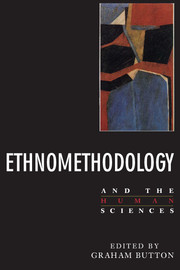Book contents
- Frontmatter
- Contents
- Contributors
- Preface
- 1 Introduction: ethnomethodology and the foundational respecification of the human sciences
- 2 Respecification: evidence for locally produced, naturally accountable phenomena of order, logic, reason, meaning, method, etc. in and as of the essential haecceity of immortal ordinary society (I) – an announcement of studies
- 3 Logic: ethnomethodology and the logic of language
- 4 Epistemology: professional scepticism
- 5 Method: measurement – ordinary and scientific measurement as ethnomethodological phenomena
- 6 Method: evidence and inference – evidence and inference for ethnomethodology
- 7 The social actor: social action in real time
- 8 Cognition: cognition in an ethnomethodological mode
- 9 Language and culture: the linguistic analysis of culture
- 10 Values and moral judgement: communicative praxis as moral order
- References
- Index
3 - Logic: ethnomethodology and the logic of language
Published online by Cambridge University Press: 05 June 2012
- Frontmatter
- Contents
- Contributors
- Preface
- 1 Introduction: ethnomethodology and the foundational respecification of the human sciences
- 2 Respecification: evidence for locally produced, naturally accountable phenomena of order, logic, reason, meaning, method, etc. in and as of the essential haecceity of immortal ordinary society (I) – an announcement of studies
- 3 Logic: ethnomethodology and the logic of language
- 4 Epistemology: professional scepticism
- 5 Method: measurement – ordinary and scientific measurement as ethnomethodological phenomena
- 6 Method: evidence and inference – evidence and inference for ethnomethodology
- 7 The social actor: social action in real time
- 8 Cognition: cognition in an ethnomethodological mode
- 9 Language and culture: the linguistic analysis of culture
- 10 Values and moral judgement: communicative praxis as moral order
- References
- Index
Summary
Introduction
In this discussion, I seek to consider various aspects of the historical divorce of Logic from a concern for the details of praxis, and the contemporary reassertion of that concern in various quarters. My purpose-built history will be designed to specify the important place of ethnomethodological studies within the current respecification of the proper object of logical inquiry broadly conceived.
Logic and practical activities: historical connections
In their splendid overview of the development of Logic, the Kneales address themselves explicitly to a range of relationships which obtained between everyday practices and the emergence of logical formalisms:
[I]t is argued that some logical thinking had been done before Aristotle which had its source in the criticism of everyday factual argument, and that this helped to give rise to a tradition independent of Aristotle, that of the Megarians and the Stoics. The first tentative steps towards logical thinking are taken when men try to generalize about valid arguments and to extract from some particular valid argument a form of principle which is common to a whole class of valid arguments. (W. and M. Kneale, 1962: 12, emphasis added)
Everyday discourse, and not only everyday factual arguments, generated various puzzles which prompted logical dissection prior to Aristotle (Kneales, 1962). The contemplation of such conceptual puzzles was developed by the Megarian school founded by a disciple of Socrates called Euclides. That this school enjoyed some success is attested to in the chronicles of Diogenes Laertius.
- Type
- Chapter
- Information
- Ethnomethodology and the Human Sciences , pp. 20 - 50Publisher: Cambridge University PressPrint publication year: 1991
- 21
- Cited by



